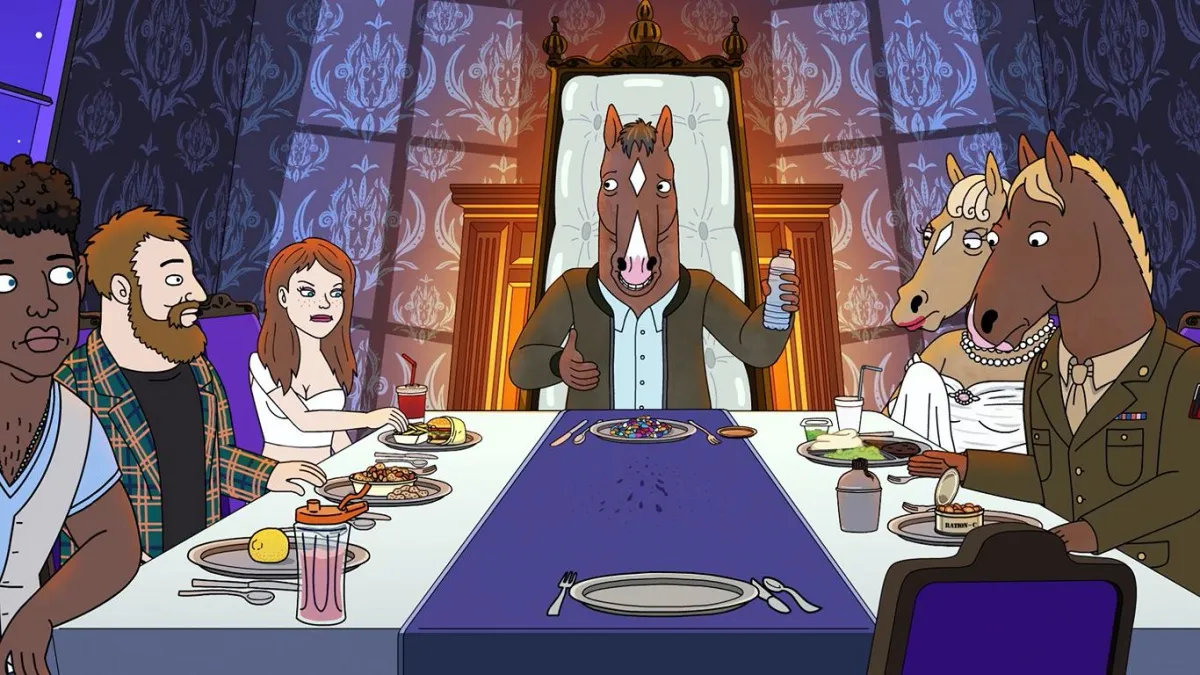So, Was the Ending of BoJack Horseman Satisfying?

(image: Netflix)
With BoJack Horseman finally being over, there is going to be a lot of debate over how it ended and whether it was satisfying, a cop-out, or it should have ended an episode earlier. For me, dear reader, I fall somewhere in the middle.
**Spoilers for the series finale of Netflix’s BoJack Horseman.**
BoJack Horseman‘s place in the television zeitgeist hit almost too perfectly, and the show has continued to elevate itself in every season, to the point where I think expectations for the finale were the highest for a show since Breaking Bad or Mad Men. There is so much real emotional investment in what it means to have this character who we have seen struggle, fail, and harm others, have an ending.
“The View From Halfway Down” is the penultimate episode of the series, and it features BoJack having a dinner party with the beautiful ghosts of his past. Sarah Lynn, Herb Kazazz, his mother Beatrice Horseman, his dead uncle Crackerjack, the hybrid of his father and Secretariat, and Courtney Jackson-Jackson, his Secretariat co-star—also Zach Braff. BoJack treats the dinner party with familiarity but also knows that he isn’t staying.
Slowly, as the episode unwinds, we realize that this dinner party is BoJack’s brain dealing with slowly dying. BoJack broke into his old home while he was drunk and high, got worse, and then got into the pool. He did manage to get out—at first. During that time, he called Diane to come and save him, and she didn’t pick up. Also, she lives in Chicago, so even if she heard his message, she couldn’t have saved him. As BoJack’s brain comes to terms with these memories, he listens to his brain’s version of Diane’s voice as the darkness comes.
Then, he wakes up.
“Nice While It Lasted” shows that BoJack was found by the family that now owns the house, arrested, and send to jail for 14 months. He gets let out for the wedding of Princess Carolyn to Jonah, and we see that BoJack knows that he can stay sober in jail or in rehab, but getting out means new temptations and struggles that he has to learn to deal with. We see him interact with his core group of “friends,” and it’s clear that there are some who will always be there in some way—Princess Carolyn and Mr. Peanutbutter—but Todd and Diane, the people who knew him best, will probably never be truly close to him again.
And he has to live with that.
Just like how Mad Men’s opening theme image of a man falling to his death made people feel that would be Don Draper’s fate, the scene of BoJack in the pool, with Diane and Mr. Peanutbutter watching him, had been speculated to symbolize his ultimate fate. While the show didn’t commit to that ending, we came really eerily close.
However, I think it was all worth it for the final scene of BoJack and Diane on the roof, having what is implied to be the last conversation they will ever have with one another. And they are both okay with that, don’t try to fight it, and BoJack just soaks in these last moments with his (former) closest friend.
In season five, Diane told BoJack that there are no good or bad people, there are just people who have the ability to do good and bad. BoJack has spent a lot of this time harming people and trying to worm his way out of responsibility. Even when he does well in his first interview after the article comes out about his last moments with Sarah Lynn, he can’t help let the glory go to his head. He fumbles, not because he is a bad person, but because he still does not know how to take full responsibility.
Now he has to live with the fact that the person who he called in that moment to save him was traumatized by that call—traumatized by the pressure she was put under to be someone’s lifeline. Death would be satisfying, thematically, but I think character-wise, BoJack needs to be alive. He needs to be able to face his actions, to have to grow from them. At the wedding, you can see how he goes from being content at the idea of teaching acting in prison, to making a “comeback” once he realizes there is buzz around him.
That is pure BoJack and a reminder that as tragic a figure he is, it has been of his own making. The show doesn’t want to give BoJack accidental martyrdom; it wants to challenge him to make acts of contrition—for as long as it takes.
Want more stories like this? Become a subscriber and support the site!
—The Mary Sue has a strict comment policy that forbids, but is not limited to, personal insults toward anyone, hate speech, and trolling.—
Have a tip we should know? tips@themarysue.com